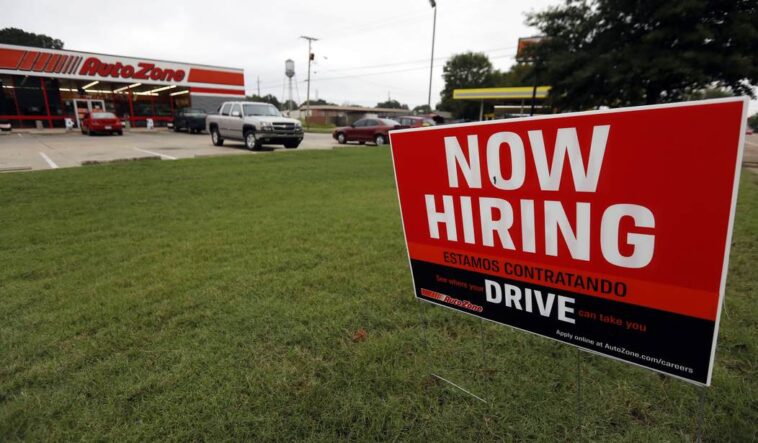Today’s jobs report brought good news for the American people. More jobs than expected were created in September, and even the July and August jobs numbers were revised up.
How did market analysts react to this news?
Well, I suppose you could say they had mixed views including its implications for the Federal Reserve’s interest rate policy.
Some analysts believe that the strong job growth and upward revisions to previous months’ data suggest an over-heated labor market and increases the likelihood of a rate hike by year-end. They argue that this could put pressure on bond yields and lead to further tightening measures.
STUART COLE, CHIEF MACRO ECONOMIST, EQUITI CAPITAL, LONDON
“We had already been given hawkish comments from some Fed officials this week. Add in today’s numbers and I think consensus will be for another hike by year end.”
“If we get a stronger inflation report next week it could be a difficult time for the markets.”
However, other analysts express relief about wage growth remaining tepid and unemployment rates staying level. They suggest that these factors may dampen inflationary pressures and could cause the Fed to reconsider its rate hike strategy.
HELEN GIVEN, FX TRADER, MONEX USA, WASHINGTON DC
“Reading the signs ahead of time the big indicator for this was JOLTS on Tuesday, posting another big upside surprise. I wouldn’t be shocked if this crazy high figure gets revised down a little bit next month, but it’s definitely a good sign for the US economy.”
“Also important to note, average hourly earnings ticked down slightly and unemployment stayed level at 3.8%, so I’d hazard a guess the Fed is pretty pleased with this morning’s release.”
Overall, the general consensus is that the job growth report is significant and may influence the Fed’s decisions, but there is uncertainty regarding the exact impact on interest rates and the overall economy.
In other words, more Americans are working, and instead of that being seen as a positive thing by “the Street,” it’s seen as a bad thing because it means the party-poopers at the Federal Reserve will have more reason to yank away the punch bowl.
The predominant economic view of those who serve on the Federal Reserve, as well as those with 7 figure salaries on Wall Street, is that inflation is caused by too many people working. Keep in mind that doesn’t include too many people on Wall Street working, but, rather, too many people on Main Street.
The pessimistic reaction to what most Americans would consider positive economic news is seen as storm clouds by those who supposedly know more about this stuff than the average American. But that is only because they’ve been trained to believe this way.
Job creation is not inflationary. Prosperity is not inflationary. Economic growth is not inflationary. A weak and unstable dollar is inflationary.
A strong jobs report is an economic positive. Full stop. The Federal Reserve, rather than seeing it as more ammunition to manipulate interest rates, should shift its focus to what is actually its primary role, which is to maintain the stability of the dollar.
Let’s get real for a moment. A strong jobs report reflects a healthy and efficient labor market where businesses have the confidence to expand and hire more workers. This indicates a well-functioning free market system that does not require constant intervention from the Federal Reserve or other government busy-bodies.
Indeed, how interesting is it that the economy added over 300,000 jobs during the same period that the politicians in Washington DC were wringing their hands over the probability of a government shutdown. The real economy was likely pulling for a government shutdown lest the politicians do more mischief. Change my mind.
Inflation is an outcome of monetary policy decisions rather than a consequence of full employment. By maintaining its focus on price stability and keeping the dollar stable, the Federal Reserve can reduce the risk of inflation without throwing a wet blanket over the American economy.
Furthermore, the strong jobs report also indicates that resources, such as labor, are being efficiently allocated within the economy by an invisible hand of the market. Americans used to understand this. As businesses expand and hire more workers, they are effectively utilizing available resources to meet increasing demand.
And, here’s the point, an increase in demand follows an increase in investment leading to increases in production. None of this is inflationary.
It is important to allow the economy to adjust and adapt naturally to changing circumstances, rather than relying on artificial interventions and attempts to fine-tune economic outcomes. Markets are smarter than the economists and academics at the Federal Reserve.
Lastly, there’s something quite unseemly, if not ghoulish when a bunch of billionaire hedge fund managers lament an economy that is putting more Americans to work and providing working families with the disposable income they need to save, invest, and improve their standard of living and their overall quality of life.
Change my mind.


